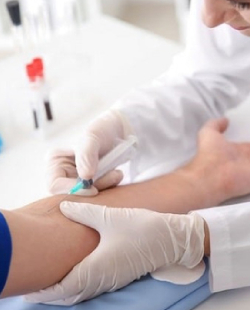The function of male sex hormones
-
- Follicle Stimulating Hormone & Luteinising Hormone
FSH and LH hormones regulate the testicular functions in a man. They are also interrelated with each other, as one (FSH) regulates the production of the sperm while the other (LH) regulates the production of testosterone. Both the FSH and LH levels are known to stay consistent in men and do not fluctuate much. However, any deviation from the normal range and cause a wide range of infertility issues – these include lowered libido and sperm count.
-
- Testosterone and Dihydrotestosterone
Testosterone is the primary male sex hormone produced in the testicles, along with some small production in the adrenal gland. Meanwhile, dihydrotestosterone is a derivate of testosterone. Together, they are vital for developing male sex characteristics and building body mass building, inducing facial and body hair.
As men age, they often make less testosterone, and as levels of testosterone drop below healthy levels, they can lead to conditions like hypogonadism or infertility. Without adequate amounts of testosterone, men become infertile. This is because testosterone assists the development of mature sperm. When a man has low testosterone or hypogonadism, he may experience – reduced sex drive, erectile dysfunction, low sperm count, and enlarged or swollen breast tissue.
-
- Prolactin
Prolactin is produced by the pituitary gland and is vital for the functioning of the male reproductive system and for his fertility. One of the primary regulators of the production of prolactin from the pituitary gland is the hormone called dopamine, which is produced by the hypothalamus. Any excess or deficiency of prolactin in the body is a cause for concern. Abnormal levels of prolactin in the body lead to hormonal imbalances causing sexual dysfunction and infertility in men.
Male hormone reference ranges
Testosterone and dihydrotestosterone
-
-
- Free testosterone (bioavailable, not bound to proteins): 90-300 pg/mg.
- Total testosterone (free + bound to proteins): 270-1070 ng dl.
-
FSH and LH
-
-
- FSH: 1.0-12.0 mIU/ml.
- LH: 2.0-12.0 mIU/ml.
-
Prolactin
-
-
- Normal prolactin levels must be between 53-360 mIU/l
-



